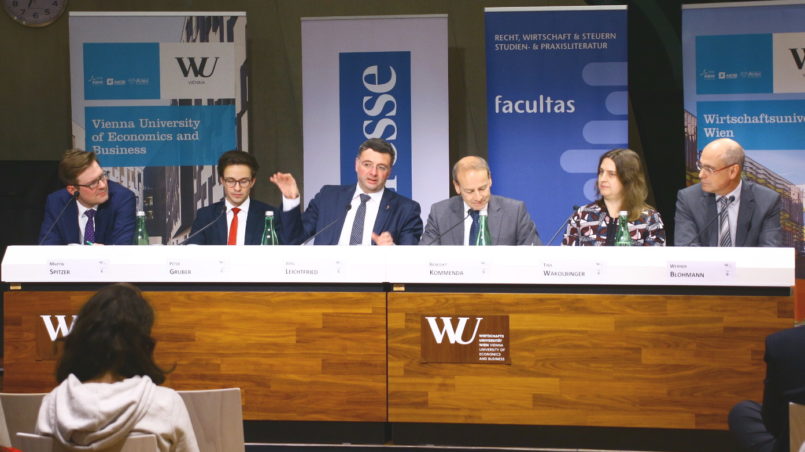Low-Priced Textiles, Disastrous Production Conditions – are there any Solutions?

Many goods, especially clothing, are surprisingly inexpensive here in Europe. However, these cheap prices are often acquired with distressing, sometimes even catastrophic working conditions in the countries of origin. What can we do to stop this from happening?
“Cheap shopping at the expense of human rights?” (translation of – “Billig einkaufen auf Kosten der Menschenrechte?”) This was the title of a panel discussion on this topic held by the Austrian daily newspaper “Die Presse” on 17 January 2018 as part of the series of events “Rechtspanorama” in the small ballroom of the Vienna University of Economics and Business. With two lawyers, an economist, a politician and a textile entrepreneur, the panel was very diverse – the proposed solutions were, accordingly, very different.
Martin Spitzer, Professor of Civil and Corporate Law, also mentioned that textile companies avoid public debate on this issue as best they can. A few years ago, however, two sensational accidents brought the subject so drastically into the public eye that it could no longer be ignored:
In 2012, 112 people died in a fire at a textile factory in Bangladesh.1 In the same year, a textile factory also burned down in Pakistan, killing 259 people, mainly because there were insufficient escape routes. The Pakistani factory mainly supplied the German textile chain KiK.2
In this context, the legally interesting question arose as to whether and how European textile companies can be held responsible for such accidents by means of civil actions for damages. In any case, the aim should be to hear proceedings in European courts and not in the producing countries, because much higher compensation sums are possible here and more public pressure can also be exerted by the threat of PR damage for the company concerned. In the case of the KiK supplier in Pakistan, this has indeed been successful; there is an ongoing trial before a German court: “Suddenly Pakistani workers in Germany are suing. That was new!”
As Peter Gruber, also a jurist, explained, the KiK case could set a precedent for the enforcement of human rights. “We are trying to initiate a reorientation in companies through the control function of the law.”
Jörg Leichtfried, from 2004-2015 EU parliamentarian from the SPÖ, reported on his experience with the EU’s foreign trade policy and pointed out its importance: “The EU is a superpower in the field of foreign trade policy.”
The EU’s foreign trade policy offers the opportunity to establish minimum standards within international trade agreements, according to Leichtfried. In recent years, a change in awareness has also been noticeable here:
Initially, European trade policy focused exclusively on free trade. It has only been since the Treaty of Lisbon of 2009 that a human rights’ dimension has been introduced into trade agreements with individual social chapters, above all in bilateral agreements with individual countries.
The economist, Tina Wakolbinger, looked at the problem from the entrepreneurial side. It is particularly relevant that human rights’ violations in the area of responsibility of a large company can have a massive impact on its reputation and turnover. However, it is not so easy for these companies to detect such problems at all: companies today have extensive networks and entire chains of suppliers so that they are often not even aware of exactly where their goods come from. New information systems may help to make supply chains transparent and traceable.
Werner Blohmann, managing director of the towelling manufacturer Vossen and the only entrepreneur on the podium, pointed out the cost problems: customers are well aware that extremely low prices are only possible with poor production conditions, but the majority are not willing to pay more for goods produced under improved conditions:
We once brought a Fairtrade line onto the market. We got a lot of backslapping for it, but very few orders.
From his point of view, therefore, not only the companies are responsible but also the customers who buy cheap products, although today people are generally well aware of the poor production conditions.
Professor Spitzer returned to the legal dimension: it is easy to find a European court dealing with an accident like the one in Pakistan under civil law. But the German court would then have to negotiate according to Pakistani law, and that is “legally a horror“. New laws are, therefore, needed that would call companies to account for the production conditions in their supplier companies.
Peter Gruber agreed with him: companies have to be committed to constantly reviewing their supply chain and to account for it. As an example, he cited a new law in France, pursuant to which companies are now expressly obliged to prevent human rights’ violations and could already be ordered to pay damages for a violation of their control obligations. France is currently playing a pioneering role; the law is exemplary, but it is a national solution that is worth much less than a Europe-wide solution.
The politician, Leichtfried, returned to the issue of the responsibility of consumers. In order to be able to make a conscientious decision for or against a product, they have to know about its production process in the first place. To achieve this, companies have to be under an obligation to provide end-to-end labelling. So far, however, this has failed in the Council of Europe because the German textile industry has been exerting pressure against stricter reporting requirements.
The participants in the discussion agreed that production conditions in developing countries, which are problematic or even contrary to human rights, must be prevented. However, according to their different backgrounds, the proposed solutions are very different:
The EU politician, Leichtfried, emphasises above all the positive creative power of EU trade policy, which could make trade agreements with third countries dependent on the effective prevention of human rights’ violations. The two jurists present, Spitzer and Gruber, see civil lawsuits as a good opportunity to exert pressure but call for more effective laws that would make companies more accountable. The only voice from the business community, Werner Blohmann, on the other hand, points to the dilemma for entrepreneurs who are under strong cost pressure on the market and expresses the wish for more responsibility on the part of consumers.
Translation German-English: Anna Dichen
_
1 https://www.theguardian.com/world/2012/nov/25/bangladesh-textile-factory-fire
2 https://cleanclothes.org/news/2015/09/09/german-retailer-kik-must-pay-promised-compensation-to-pakistani-factory-fire-victims
Credits
| Image | Title | Author | License |
|---|---|---|---|
 |
00-Podiumsdiskussion_Billige-Textilien_Martin-Krake_CC BY-SA 4.0- | Martin Krake | CC BY-SA 4.0 |
